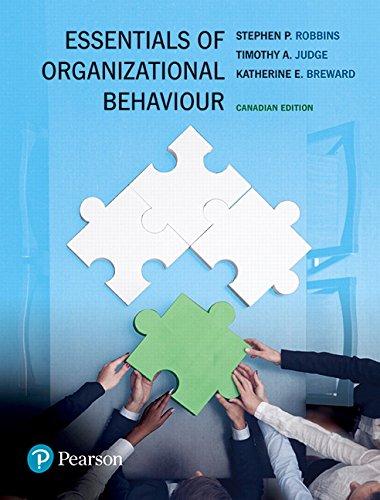Paloma Dupries could not believe her eyes. Are they serious? she said out loud to nobody in
Question:
Paloma Dupries could not believe her eyes. “Are they serious?” she said out loud to nobody in particular. “This is ridiculous!”
She has just received a message from her union in response to a job sharing request she had made. She had been working as a nurse in a small hospital in New Brunswick for five months, fulfilling a paternityleave contract. Now the new father, Victor Patel, had announced that, although he did want to return to his job, he also wanted to fully participate in raising his twin sons. Therefore he wished to return on a part-time basis, working only three days per week. Paloma has been thrilled to hear the news, because it meant she might be able to keep her job for the other two days a week. Since she had been planning to pursue a master’s degree at the local university, a part-time job would be ideal.
She discussed it with Victor and they both agreed it was a great solution.
Victor and Paloma went to their immediate manager with the proposal.
The manager also thought it a great idea, but cautioned them that since this represented a nonstandard work arrangement the union would have to approve it. Despite these cautions, Victor and Paloma felt somewhat giddy. It was such a good solution for them both, they were excited about seeing an ideal lifestyle developing in which each could balance personal goals with their need for income. Then the response from the union came.
It stated that job sharing could only occur if both parties shared the job exactly equally, meaning each would work for 2.5 days a week. The union felt that any other arrangement would be disadvantageous to the person with the reduced work hours and they were unwilling to support that inequity.
“But that makes no sense,” opined Victor, “as long as we both agree to the work split that should be all that matters.” “I agree,” said Paloma, “and I tried to explain that to them, but they won’t listen to me. Is there any way we could just do the 2.5-day split?” “Unfortunately not,” replied Victor.
“My wife is an accountant and she has looked carefully at the numbers.
We can only afford to do this if I can get three days a week. Losing that half-day tips us over into a financially nonviable situation.” “How frustrating,” commented Paloma, “because while I am in school, two days a week is all I could really handle anyway.”
After further conversations with management and their union steward, the two workers realized the situation was futile and they abandoned their attempt at job sharing. Word got around, as it always does, and Paloma found that many sympathetic coworkers came over on her last day to express their regrets about her leaving. Victor, for his part, felt stressed out about returning full-time but felt he had little choice.
Six months later, Paloma ran into Victor at the local Tim Hortons. “How are things going at the hospital?” she asked curiously. “Pretty much business as usual,” replied Victor, “I’ve been looking for other work, but no luck yet so I am still there. The oddest thing is happening though.
Everyone is copping attitude with the union steward and he is probably going to get thrown out at the next election. He hasn’t really done anything wrong. A few bad decisions were made, like the one about our job sharing proposal, but those were made by committees, not just him personally. Still, the negativity seems to have rubbed off on him; nobody likes him or wants him to represent them anymore. To be honest, I feel a little sorry for him.” “Not me,” said Paloma, “If you ask me he got what he deserved, committees or not!”
Discussion Questions
1. What emotional responses should the union have anticipated as a result of refusing this request? Could those responses have been better managed somehow?
2. What emotional responses could the union have anticipated as a result of granting this request? How might those responses have been leveraged to help drive positive workplace outcomes?
3. Discuss the role emotional contagion may have had in influencing perceptions about the union steward.
Step by Step Answer:

Essentials Of Organizational Behaviour
ISBN: 9780134182971
1st Canadian Edition
Authors: Stephen P. Robbins, Timothy A. Judge, Katherine Breward





